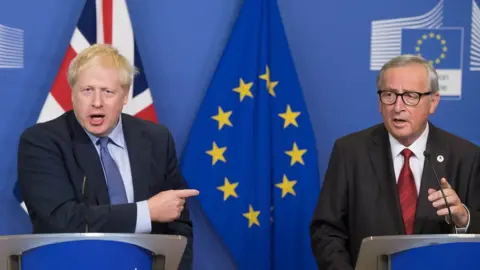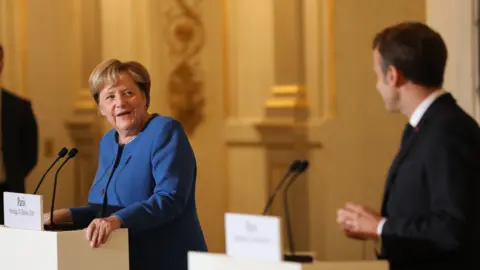Brexit: What does the deal say about workers' rights?
 Getty Images
Getty ImagesLabour has warned that Boris Johnson's revised Brexit deal would threaten workers' rights and protections in the future. The concerns have been echoed by several union leaders.
But Boris Johnson has insisted the UK will "maintain the highest possible standards in social protections and the environment".
So, why the sudden focus on workers' rights?
It's all to do with something called the "level playing field" - the idea that countries keep their rules and standards close, to stop one country giving their businesses a competitive advantage - for example by having lower standards and so lower costs.
EU regulations
The extent to which the UK might diverge from EU regulations in the future and become an economic competitor has been a big issue in the Brexit debate.
EU regulations cover things like:
- The working time directive, which limits the number of hours people can work
- Maximum amounts of particular pollutants there can be in the air
- Requirements for workers doing the same jobs to be paid equally.
They set minimum standards below which government cannot go. After Brexit, UK governments would no longer have to abide by these minimum levels.
In the new Brexit deal finalised this week, references to a level playing field were removed from the legally-binding withdrawal agreement.
Instead, they appear in the non-binding political declaration on the future relationship - as an aspiration, but not a legal commitment.
Labour's shadow Brexit secretary, Sir Keir Starmer accused the government of pursuing "a licence to deregulate" the economy in the future.
He warned that - after Brexit - the UK might choose to follow other "economic models" (than the EU's) and cited the example of the United States where, he said, the holiday entitlement was 10 days a year and companies "had far more power than the workforce".
In response to concerns, the government said that after Brexit it would report back to parliament whenever the EU changes its rules on workers' rights, on whether the UK plans to take action to mirror them. MPs would be given a chance to vote on this.
 PA Media
PA MediaFree trade
Boris Johnson has made it known that he wants a slightly more distant economic relationship with the EU in the future than Theresa May did.
She talked about the "broadest and deepest possible" economic partnership. He wants a more basic free trade agreement, with zero tariffs (taxes on imports) or quotas, which gives the UK more opportunity to go its own way.
Too many level playing field commitments could get in the way of that.
The revised political declaration says that the UK and the EU should "uphold the common high standards... in the areas of state aid, competition, social and employment standards, environment, climate change, and relevant tax matters".
But if words of that kind do not appear in a binding treaty, then this or any future government could opt to change its mind.
The EU is well aware of that - and some countries are more concerned about the nature of the future relationship in this area than in the precise details of the divorce agreement.
 EPA
EPA"With the departure of Great Britain, a potential competitor will of course emerge for us," Angela Merkel said on a visit to Paris in the run-up to this summit.
"That is to say, in addition to China and the United States of America, there will be Great Britain as well."
The UK is a far smaller economy than the US or China. But it is right on the EU's doorstep, intimately connected to European markets, and thus is seen as a potential threat.



